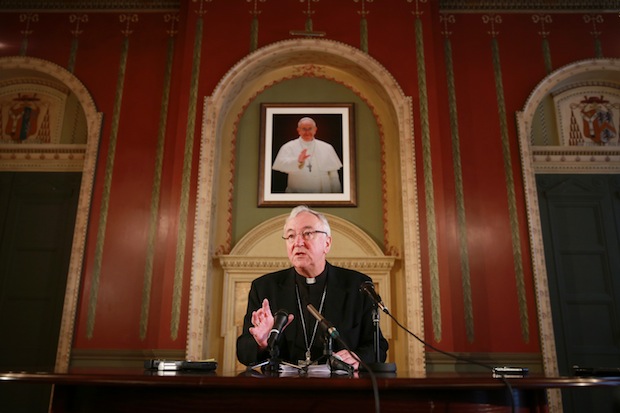Even though, as I said earlier, it makes sense for David Cameron to come out fighting in favour of his party’s welfare reforms after they were slammed by the Archbishop of Westminster, there’s a point worth considering about how useful these criticisms from leading lights both in the Catholic Church and Church of England are for the Left. Nichols has since said that the government’s cuts and reforms are ‘perfectly understandable’, but that ‘what is beyond my understanding is why a programme of reform needs to result in people who, when they are given some food, burst into tears because they haven’t eaten in three days’.
This is precisely the stance that the Left has taken on welfare reform. The Labour party supports benefit cuts (apart from the so-called ‘bedroom tax’ which it is politically expedient to oppose, not just because it is the only welfare cut that doesn’t poll spectacularly well but because the SNP have made it one of the key points in their independence campaign) in principle, and supports welfare reform in principle. But the party’s support in principle is a bit like a teenager who agrees to go for a walk with their parents and then spends the whole walk moaning loudly that they don’t like walking and that it’s too muddy. Worse, their record in government suggests that this teenager would probably cut the walk off halfway through and trudge back home – when Labour did try to reform welfare, the furious reaction from within the party and campaigning groups made ministers back down.
Whenever difficult stories emerge about the impact of the reforms, Labourites lay into them. Which might be fair enough, as they’re the opposition party, but they offer precious little in the way of detail on how they would reform welfare and reduce the bill without the same sorts of stories cropping up.
Nichols is doing his job by giving his opinion on the welfare reforms, even if he is wrong and even if bishops could sometimes do with talking about other huge injustices for the poor, such as the fact that governments set a minimum wage that is supposedly the very least someone can afford to live on, then insist on taxing that wage, or supply-side problems such as housing and food prices.
But the Labour party isn’t an Archbishop: it should have a rounded view of public policy that involves the realisation that welfare reform will inevitably cause upheaval. That’s not to say that the current levels of upheaval are right or wrong, but the party’s approach of late has been to neutralise the issue rather than give much detail beyond accepting that it will need to make cuts itself. If it does find itself in power in 2015, it may find that bishops are just as willing to criticise the consequences of some of the cuts it does finally settle upon. So Nichols and others are helpful to the Left for now with their criticisms of welfare that don’t quite take account of the full picture – but they might not be forever.







Comments